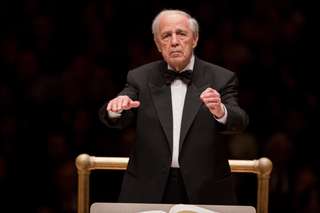|
Back
An Imaginary Corpse in an Imaginary Copse New York
Stern Auditorium, Carnegie Hall
05/16/2010 -
Béla Bartók: A fából faragott királyfi, Opus 13 (The Wooden Prince)
Arnold Schoenberg: Erwartung (Expectations), Opus 17
Deborah Polaski (Soprano)
The MET Orchestra, Pierre Boulez (Conductor)

P. Boulez (© Vienna Philharmonic Orchestra)
My usually loving spaniel Cocoa looked downright dangerous yesterday afternoon. And his eyes said it all.
His eyes accused me. “Harry, the sky is Cerulean blue, cloudless, not a breath of wind. It’s Sunday. Where’s my big long walk??”
“Look, Cocoa, the weather is fine. But this is the perfect day for a nightmare. I have this concert with Pierre Boul……”
His eyes wouldn’t let me finish. “Boul? Boul? His ears popped up. “Okay, let’s play Boul in the park.”
“You don’t understand. I’m listening to Bartók….”
“Great,” he wagged his tail. “After playing Boul, we can sit outside. You order a vodka, I’ll lap up my water, and we’ll have some serious bar talk. Or even…” (he grinned) “…bark talk, Ya get it?”
I grimaced, continuing, “…and Arnold Schoenberg!”
“Hey,” his eyes twinkled. “I’ll take any kind of burger. And a Schoenburger sounds really bee-yoo-tee-ful…….”
I’d had enough, and told him so.
“It’s Boulez (not ball), and he’s conducting music for a pair of expressionist dramas which take place in deep forests, and here’s a biscuit, and now I’ve got to go!!”
With Ella Fitzgerald on the computer for Cocoa, the door locked, I went into the sunlight, and prayed that Maestro Boulez would please, please, please move the MET Orchestra from the confines of Stern Auditorium out to sunny Central Park, where we could a) watch the Princess dance with the mythical Wooden Prince, b) follow the anonymous woman stumbling upon bogs and bodies, and c) get some fresh air.
My hopes were dashed even here (conductors have no imagination!), so while Cocoa had presumably fallen asleep, I was imprisoned inside a concert hall.
Actually, Maestro Boulez didn’t need Central Park for Bartók’s Wooden Prince. As expected, the first bars of the pantomime–in a lulling C major– proclaimed trees, streams, the deep forest, his unerring baton producing the opening of Rheingold Magyar style. And as expected, the brilliant MET Orchestra played a Bartók piece which, like Miraculous Mandarin, was grotesque, highly rhythmic and filled with orchestral color.
Maestro Boulez knew enough not to make it beautiful per se. Once we came away from the Elysian fields, he jerked the Hungarian dances and wind cadenzas almost erratically, enunciating the aberrant rhythms rather than the lush orchestrations.
It was unfortunate that the program notes gave no indication of the story, but obviously the audience (with the exception of one man who stomped out, confused) was still entranced with the music. They couldn’t help it. The “Dance of the Waves” was a mighty effort, and the climax of the fourth dance was such a colossal orchestral tutti–almost literally making the chandeliers shake–that the effect was shattering.
Some decades ago, we would have been happy just to see the Metropolitan Opera Orchestra get through this without errors. Today, the MET Orchestra has some of the best wind players in New York, and the brass, for Mr. Boulez’s climaxes, were faultless.

D. Polaski (© MET Orchestra)
Schoenberg’s Erwartung is simply one of the marvels of the last century. Composed just on that pinpoint junction between Schoenberg’s utter romanticism and his scholastic 12-tone theory, this, like the Bartók, doesn’t quite have a name to describe it. Bartók’s was a “pantomime”, not a ballet. This is a “monodrama”, not a one-woman opera. Both take place in a Grimm-like forest (yes, the Freudian forest), and neither say exactly what they mean.
Bartók’s was a work which alternated between dream and nightmare. Erwartung is pure nightmare. Our (unnamed) woman searches for her unnamed lover at night in a dark forest. Is he with another woman? Is he waiting for her? Has something happened?
In her hysteria, our woman grows frightened of insects and animals, shadows of branches and–finally–a corpse. Yes, it’s her lover. Yes, he’s dead. And yes, in her hysteria, she cries out, in the last magical measures, “Oh, are you here….I was seeking….”
And the orchestra plays scales going in opposite directions, oh so softly.
I have heard this sung with the soprano leading the orchestra, making it into a pure monologue with accompaniment. Mr. Boulez knew enough not to do that. With such a fine orchestra, he delicately turned it into a symphonic chamber piece, without theme, without form, and one soprano who sings through the instruments.
Deborah Polaski, one of the Met’s favorite Elektras and Brünnhildes, has the pitch-perfect power to play this enigmatic role. Erwartung is no long aria, it isn’t a chant, except for a single measure she doesn’t even speak. But we hear no themes, only the grisly mordant tale of a woman in deep frightening pain. With the vocal muscle. When Ms. Polaski discovers the body and soars from pianissimo to fortissimo, from a middle G sharp up to a high B–holding it for three measures–the effect was scary, as it should have been.
And while the music was magnetic, alas, Ms. Polaski made not the slightest dramatic effect for us to see that woman’s fight. The very bright Carnegie Hall lights precluded the darkness of the forest, and Ms. Polaski, reading from the score, used only her voice, not her body, to depict the horrors of fauna, flora, and the intensity of death in this most intense melodramatic Schoenberg score.
This was probably enough, for the two works, under Mr. Boulez, were sufficient to shatter this listener until a return to the house and the dog.
“Well,” asked Cocoa’s eyes. “Who did it?”
“Who did what?”
“Kill the chick’s boyfriend in the forest. The corpse in the copse.”
“We don’t know. Maybe the girl, maybe his other girlfriend, maybe he killed himself, maybe it’s her imagination….”
Cocoa yawned. His eyes said, “Well, that’s hardly a good mystery, if you don’t know the answer”
“To make it even worse,” I said, “not even the girl is real. She’s a figment of the poet’s artistry. No girl, no forest, no body. Nothing but music.”
Cocoa looked bored, pondered for a moment on how us two-legged dogs waste a good springtime Sunday afternoon. Then his eyes lit up, and his tail wagged.
“Listen,” they trilled canonically, “Throw me another biscuit, take me out to play ball. And we’ll forget this ever happened."
Harry Rolnick
|